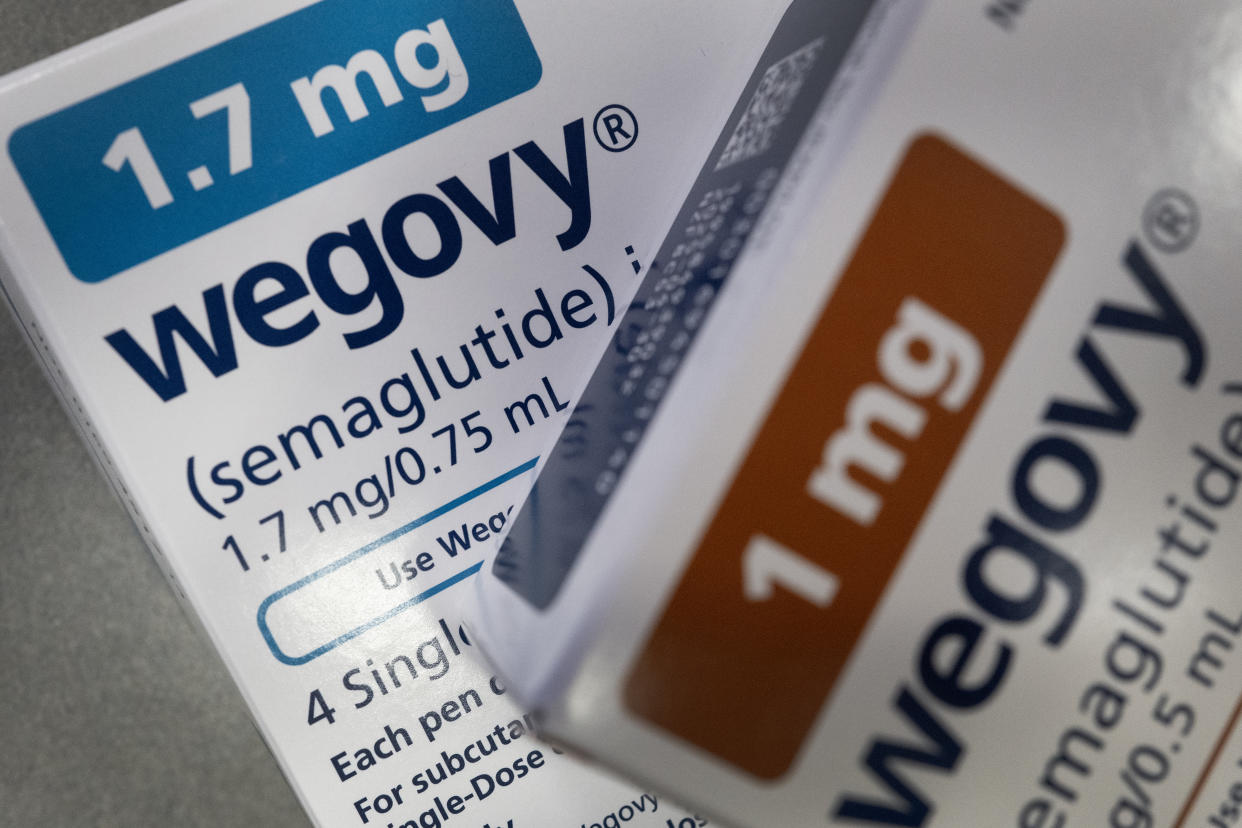How expanded use of GLP-1s could affect long-term outlooks for Eli Lilly and Novo Nordisk
Just a few short years after coming to market, the latest GLP-1 drugs are showing versatility in battling diseases related to diabetes and obesity, lifting the fortunes and expectations for market leaders Novo Nordisk (NVO) and Eli Lilly (LLY).
Both companies will report first quarter earnings this week — Lilly on April 30 and Novo on May 2 — and all eyes will be on their GLP-1 portfolios.
Wall Street estimates Eli Lilly will bring in revenue of $8.9 billion, up from nearly $7 billion in the first quarter of 2023; Novo Nordisk, meanwhile, is expected to report at least $9 billion, compared to $7.2 billion last year, according to Bloomberg.
Novo's blockbuster drugs — Ozempic to treat diabetes and Wegovy for weight loss — are also known by their formula name, semaglutide. Lilly's key drugs — Mounjaro for diabetes and Zepbound for weight loss — are known by their formula name, tirzepatide.
The diabetes drugs have been on the market for a few years but rose in prominence after celebrities began to tout their weight loss properties.
Analysts expect Ozempic and Wegovy combined to bring in sales of $26 billion for Novo for the full year 2024, and Mounjaro and Zepbound could net Lilly about $13.5 billion, according to Bloomberg.
Over the last year, both companies' stocks have outperformed the broader market. Lilly's 85% rally gave it a market value of nearly $700 billion, making it one of the 10 biggest companies in the S&P 500.
Wegovy and Zepbound were only recently approved by the FDA for weight loss; Zepbound was approved last year, while Wegovy was approved in 2021.
Still, the demand for all four has skyrocketed in the past year, leading to ongoing shortages and both manufacturers admitting they would not be able to keep up with demand in the near-term.
In a note to investors earlier this month, Leerink Partners analyst David Risinger said that the GLP-1 franchise is "constrained by supply limitations."
Citing data from pharmaceutical research firm IQVIA, Risinger found weekly prescriptions slowed between the week ending on April 12 and the week ending on April 19. Mounjaro dropped from 90,468 prescriptions in the earlier week to 87,179 in the latest. Similarly, Zepbound dropped from 75,453 in the week of April 12 to 51,092 in the week of April 19.
Lilly CEO David Ricks told Yahoo Finance earlier this year that the company expects to continue to see shortages as it focuses on ramping up to meet demand.
On a call with investors in February, Ricks said, "While we're continuing to expand supply every quarter, we expect the most significant production increases to come in the second half of the year."

Other factors will also increase demand and exacerbate the shortages, further limiting access to the drugs. In March, Novo's Wegovy was approved by the FDA for those with cardiovascular disease and risk of heart attack and death. Novo Nordisk is also conducting a trial for kidney disease.
Eli Lilly, meanwhile, recently shared positive results for using Zepbound to help patients with sleep apnea. While exact numbers for potential new prescriptions are unknown, more than 45% of obese adults suffer from sleep apnea.
There are hundreds of other trials, either sponsored by the drugmakers or by academic or government research agencies, looking at other potential benefits of these drugs.
That includes liver disease, kidney disease, other diseases like Parkinson's and Alzheimer's, as well as infertility or polycystic ovary syndrome (PCOS). There are also clinical trials underway to help assess the safety of these drugs in people who have just given birth.
Increasing coverage
The drugs being approved and prescribed for conditions other than weight loss will likely open them up to being covered by insurance companies, employers, and government programs such as Medicare and Medicaid.
Currently only 40% of large employers cover the drugs for weight loss alone. Medicare, the largest government payer, doesn't cover weight-loss drugs.
With more opportunity down the pike, that could fulfill analyst predictions of a $100 billion-plus market for the GLP-1 category.
In the case of Wegovy, for example, research and analytics firm Global Data said in a recent report, "Semaglutide will continue to be the market-leading GLP-1RA and will experience significant growth in market sales, particularly towards the end of the decade."
Arthur Caplan, a bioethicist and professor at New York University's Grossman School of Medicine, said the current trend is likely to make GLP-1s as ubiquitous as Viagra.
It will all add up to a very expensive future, he said: one that the federal government is trying to fight.
Sen. Bernie Sanders ( D-Vt.), announced last week he is launching an investigation into the pricing of GLP-1s by Novo Nordisk. He noted the stark difference in US pricing — $969 per month for Ozempic, versus $155 per month in Canada.
Reports suggest there could be a reduction in pricing once more competition enters the market, of which there is no shortage. There are currently at least 114 drugs in various phases of clinical trials, according to health news outlet STAT.
Caplan balked at the idea, saying the theory that competition will drive down the cost is "ridiculous."
"I can't of anything where there's just been a couple of under-patent drugs competing where that drove the price down," he said.
Anjalee Khemlani is the senior health reporter at Yahoo Finance, covering all things pharma, insurance, care services, digital health, PBMs, and health policy and politics. Follow Anjalee on all social media platforms @AnjKhem.
Read the latest financial and business news from Yahoo Finance
